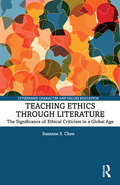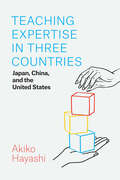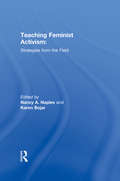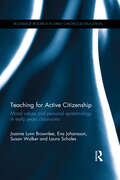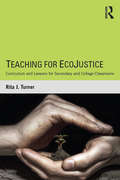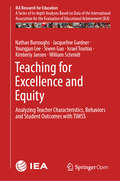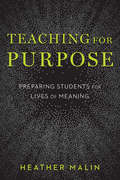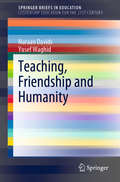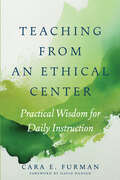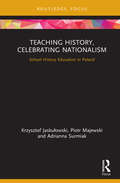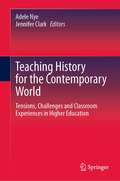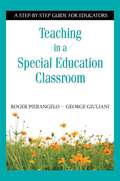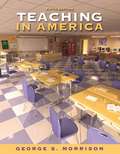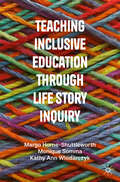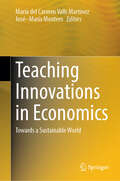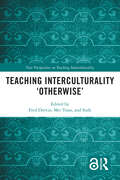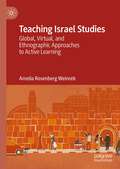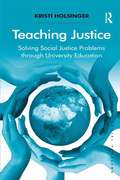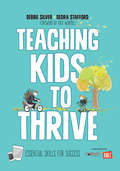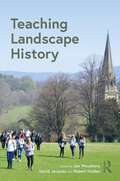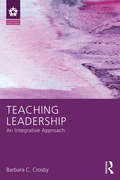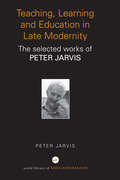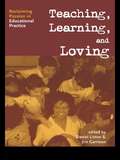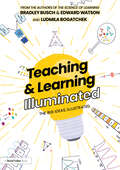- Table View
- List View
Teaching Ethics through Literature: Igniting the Global Imagination (Citizenship, Character and Values Education)
by Suzanne S. ChooTeaching Ethics through Literature provides in-depth understanding of a new and exciting shift in the fields of English education, Literature, Language Arts, and Literacy through exploring their connections with ethics. The book pioneers an approach to integrating ethics in the teaching of literature. This has become increasingly relevant and necessary in our globally connected age. A key feature of the book is its integration of theory and practice. It begins with a historical survey of the emergence of the ethical turn in Literature education and grounds this on the ideas of influential Ethical Philosophers and Literature scholars. Most importantly, it provides insights into how teachers can engage students in ethical concerns and apply practices of Ethical Criticism using rich on-the-ground case studies of high school Literature teachers in Australia, Singapore and the United States.
Teaching Expertise in Three Countries: Japan, China, and the United States
by Akiko HayashiA comparison of the development of expertise in preschool teaching in China, Japan, and the United States. In Teaching Expertise in Three Countries, Akiko Hayashi shows how teachers from Japan, China, and the United States think about what it means to be an expert teacher. Based on interviews with teachers conducted over the span of fifteen years and videos taken in their classrooms, Hayashi gives us a valuable portrait of expert teachers in the making. While Hayashi’s research uncovered cultural variations in the different national contexts, her analysis of how teachers adapted their pedagogy throughout their careers also revealed many cross-national similarities. Younger teachers often describe themselves as being in a rush, following scripts, and “talking too much,” while experienced teachers describe themselves as being quieter, knowing children better, and being more present. Including a foreword by scholar of early childhood education Joseph Tobin, Teaching Expertise in Three Countries provides a foundation for understanding the sequence and pathways of development over the first decade of teaching in three national contexts, demonstrating the value of the field of comparative education in the process.
Teaching Feminist Activism: Strategies from the Field
by Nancy A. Naples Karen BojarFrom theoretical analysis to practical teaching tools, an indispensable guide for educators seeking to link feminist theory and activism to their teaching. Included are web sites, videos, recommended texts, and additional course outlines.
Teaching for Active Citizenship: Moral values and personal epistemology in early years classrooms (Routledge Research in Early Childhood Education)
by Eva Johansson Laura Scholes Joanne Lunn Brownlee Susan WalkerThere is strong social and political interest in active citizenship and values in education internationally. Active citizenship requires children to experience and internalize moral values for human rights, developing their own opinions and moral responsibility. While investment in young children is recognised as an important factor in the development of citizenship for a cohesive society, less is known about how early years teachers can encourage this in the classroom. This book will present new directions on how teachers can promote children's learning of moral values for citizenship in classrooms. The research provided offers important insights into teaching for active citizenship by: • providing an analysis of educational contexts for moral values for active citizenship • highlighting teachers’ beliefs about knowing and knowledge (personal epistemologies) and how these relate to children’s learning and understanding about social and moral values • discussing the impact of teachers’ beliefs on teaching practices. Evidence suggests that investment in the early years is vital for all learning, and specifically for developing an understanding of active citizenship for tolerant and cohesive societies. This book will be essential reading for the professional education of early years teachers interested in teaching for active citizenship.
Teaching for EcoJustice: Curriculum and Lessons for Secondary and College Classrooms
by Rita J. TurnerTeaching for EcoJustice is a unique resource for exploring the social roots of environmental problems in humanities-based educational settings and a curriculum guidebook for putting EcoJustice Education into practice. It provides model curriculum materials that apply the principles of EcoJustice Education, giving pre- and in-service teachers the ability to review examples of specific secondary and post-secondary classroom assignments, lessons, discussion prompts, and strategies that encourage students to think critically about how modern problems of sustainability and environmental destruction have developed, their root causes, and how they can be addressed. The author describes instructional methods she uses when teaching each lesson and shares insights from evaluations of the materials in her classroom and by other teachers. Interspersed between lessons is commentary about the rationale behind the materials and observations about their effect on students.
Teaching for Excellence and Equity: Analyzing Teacher Characteristics, Behaviors and Student Outcomes with TIMSS (IEA Research for Education #6)
by Nathan Burroughs Jacqueline Gardner Youngjun Lee Siwen Guo Israel Touitou Kimberly Jansen William SchmidtThis open access book examines the interrelationship of national policy, teacher effectiveness, and student outcomes with a specific emphasis on educational equity. Using data from the IEA’s Trends in International Mathematics and Science Study (TIMSS) conducted between 1995 and 2015, it investigates grade four and grade eight data to assess trends in key teacher characteristics (experience, education, preparedness, and professional development) and teacher behaviors (instructional time and instructional content), and how these relate to student outcomes. Taking advantage of national curriculum data collected by TIMSS to assess changes in curricular strategy across countries and how these may be related to changes in teacher and student factors, the study focuses on the distributional impact of curriculum and instruction on students, paying particular attention to overall inequalities and variations in socioeconomic status at the student and country level, and how such factors have altered over time. Multiple methods, including regression and fixed effects analyses, and structural equation modelling, establish the evolution of these associations over time.
Teaching for Purpose: Preparing Students for Lives of Meaning
by Heather MalinIn Teaching for Purpose, Heather Malin explores the idea of purpose as the purpose of education and shows how educators can prepare youth to live intentional, fulfilling lives. The book highlights the important role that purpose—defined as &“a future-directed goal that is personally meaningful and aimed at contributing to something larger than the self&”—plays in optimal youth development and in motivating students to promote the cognitive and noncognitive skills that teachers want to instill. Based on a decade of research conducted at the Stanford University Center on Adolescence, the book explores how educators and schools can promote purpose through attention to school culture, curriculum, project learning, service learning, and other opportunities. Malin argues for expansive thinking on the direction schools should take, especially in terms of educating students to be creative, innovative, and self-directed critical thinkers. The book includes profiles of six organizations working in schools across the US that have made purpose development a priority. Infused with the engaging voices of purposeful youth, Teaching for Purpose offers a fresh, inspirational guide for educators who are looking for new ways to support students to succeed not only in school, but in life.
Teaching, Friendship and Humanity (SpringerBriefs in Education)
by Nuraan Davids Yusef WaghidThis book extends liberal understandings in and about democratic citizenship education in relation to university pedagogy, more specifically higher teaching and learning. The authors’ argument is in defence of cultivating humanity through (higher) educational encounters on the basis of virtues that connect with the idea of love. Unlike romantic and erotic love, the book examines love in relation to educational encounters whereby humans or citizens can engage autonomously, deliberatively andresponsibly, yet lovingly. The rationale for focussing on the notion of philia (love) in educational encounters, the authors argue, is that doing so allows our current understandings of such encounters to be expanded beyond mere talk of reasonable engagements—autonomous action, deliberative iterations, and simple action—toward emotive enactments that could enhance human relations in educational encounters.
Teaching from an Ethical Center: Practical Wisdom for Daily Instruction
by Cara E. FurmanA methodology for using philosophy to guide teaching preparation and practice
Teaching History, Celebrating Nationalism: School History Education in Poland
by Krzysztof Jaskułowski Piotr Majewski Adrianna SurmiakThis book analyses the relationship between history education and nationalism in the context of the dominant structures of collective memory in Poland. Drawing on original qualitative research with history teachers, it explores the ways in which teachers understand the aims of history teaching and how they teach history, with some contesting or negotiating official and hegemonic nationalist memory projects, while others predominantly reproduce or radicalise them. A study of teachers’ tendencies to approach history through the prism of nationalism, this study reveals a view of history lessons as a means of instilling national identity in students, as the past is constructed in nationalist terms and no contradiction is identified in viewing history as both an objective science and a ‘nationalising’ tool. An examination of the means by which a dominant nationalist discourse is reinforced through historical education, Teaching History, Celebrating Nationalism will appeal to scholars of sociology and education with interests in nationalism and memory studies.
Teaching History for the Contemporary World: Tensions, Challenges and Classroom Experiences in Higher Education
by Adele Nye Jennifer ClarkThis book brings together history educators from Australia and around the world to tell their own personal stories and how they approach teaching history in the context of contemporary tensions in the classroom. It encourages historians to think actively about how history in the classroom can play a role in helping students to make sense of their world and to act honourably within it.The contributors come from diverse backgrounds and include experienced history educators and early career academics. They showcase both a mix of approaches and democratize and decolonize the academy. The book blends theory and practice. It reflects on what is happening in the classroom and supports the discipline to understanding itself better, to improve upon its practices and to engage in academic discussion about the responsibility of teaching in the contemporary world.
Teaching in a Special Education Classroom: A Step-by-Step Guide for Educators
by Roger Pierangelo George GiulianiDesigned for professionals working in a resource room, self-contained special class, or inclusive setting, this step-by-step guide helps new teachers in special education get their careers off to a positive start and offers experienced teachers supportive information to help improve classroom practice.Special education experts Roger Pierangelo and George Giuliani review all aspects of special education teaching, from how to get to know your students before school starts to writing end-of-the-year reports. Teaching in a Special Education Classroom offers straightforward advice to make the school year more productive for you and your students.
Teaching in America (5th Edition)
by George S. MorrisonTeaching in America, 5/e, is a hands-on, practical text that provides pre-service teachers with comprehensive and current information about teaching in today's diverse American classrooms. The Fifth Edition promises to be the most dynamic and practical to date. With a complete redesign; a host of new research, features, and exercises; as well as a new feature box designed specifically to show pre-service teachers how use observation effectively, this text is sure to draw attention beyond its steady and loyal base. Its "working-text" style continues to provide pre-service teachers with extensive opportunities to interact with the text while establishing both the foundations of American education and a clear picture of the realities of contemporary teaching. Its increased emphasis on accountability woven throughout the text and the marginal references to INTASC standards raise the readers' awareness of key initiatives in education in the 21stcentury.
Teaching Inclusive Education through Life Story Inquiry
by Margo Horne-Shuttleworth Monique Somma Kathy Ann WlodarczykThis practical textbook is designed as core reading for pre-service and in-service teachers and mental health practitioners in upper level Education and Psychology programs. Key concepts addressed in this case study collection include Inclusive Education as an overarching framework through the lens of Critical Disability Studies, Intersectionality and Mental Health. It portrays the first-hand accounts and lived experiences of individuals with disabilities to further understand the impact students’ classroom experiences have beyond their early school years. These accounts along with commentaries from education and health professionals inform evidence-based recommendations for educators and practitioners on prevention and intervention practices for school age children with disabilities. Readers will be prompted to consider their experiences and perspectives through chapter specific discussion-based and reflective questions that are designed to incorporate key concepts addressed throughout the text.
Teaching Innovations in Economics: Towards a Sustainable World
by María del Carmen Valls Martínez José–María MonteroThis book highlights the latest technological innovations in economics education. Economics, as a discipline, not only studies the relationship between ends and scarce means, which can be used alternatively, but also serves as a social science that uses historical data to predict future events—a task complicated by the influence of human behavior. In economics, a solid theoretical foundation alone is insufficient; practical application requires a deep understanding of statistics. With the vast amount of information available today, data processing is now performed using specialized software. Consequently, teaching economics demands a wide range of complex skills that have significantly evolved in recent years, driven by the growing interest in educational innovation among professors and scientists, further accelerated by advancements in new technologies. Moreover, economics education is increasingly aligned with the global concern for sustainability, as emphasized in the United Nations' Agenda 2030. Professors are now integrating sustainability into syllabi and teaching methodologies. This book covers key topics such as: Technological and innovative advancements in economics education. New teaching-learning theories and models in economics education. The impact of digital transformation on economics education. The role of artificial intelligence in economics education. Addressing special educational needs in economics education. Evaluation of the teaching-learning process in economics. Assessment of student learning in economics. Development of materials and tools for economics education. Final projects (Undergraduate and Master's) in economics. Authored by leading professors and researchers in the field, this book presents a collection of chapters that rigorously explore teaching innovations in economics.
Teaching Interculturality 'Otherwise' (New Perspectives on Teaching Interculturality)
by Fred Dervin, Mei Yuan, and SudeThis edited volume focuses on the thorny and somewhat controversial issue of teaching (and learning) interculturality in a way that considers the notion from critical and reflexive perspectives when introduced to students. Comprised of three parts, the book discusses the nuts and bolts of teaching interculturally, considers changes in the teaching of interculturality, and provides pedagogical insights into interculturalising the notion. It studies both teaching im-/explicitly about interculturality and how to incorporate interculturality into teaching practices or into an institution. By sharing varied cases and theoretical reflections on the topic, the editors and contributors from different parts of the world aim to stimulate more initiatives to enrich the field instead of delimiting it, especially in complement to and beyond the 'West' or 'Global North', and also to build up further reflexivity in the way readers engage with interculturality in education. This will be a must-read for teachers and researchers of intercultural communication education at different educational levels, as well as anyone interested in scholarship on education for interculturality.
Teaching Israel Studies: Global, Virtual, and Ethnographic Approaches to Active Learning
by Amelia Rosenberg WeinrebThis book presents pedagogical strategies for today’s diverse Israel Studies classrooms. It offers Israel-specific innovations for online teaching, tested methods for organizing global virtual exchanges that uplift marginalized voices in Israel, including Palestinian voices, and an intellectual and political overview of the field. Informed by the author’s experiences in the classroom and principles shared with her by fellow instructors, the book provides a guide to developing an Israel Studies syllabus or integrating Israel Studies units into an existing curriculum
Teaching Justice: Solving Social Justice Problems through University Education (Solving Social Problems)
by Kristi HolsingerTeaching Justice explores the role that teaching and learning in higher education can play in solving problems of social injustice. Examining a range of approaches to education, it considers the challenges that exist in teaching about justice, drawing on extensive empirical data gathered amongst college lecturers and professors, as well as the author's own experience. With an analysis of the strategies commonly used this book will shed light on the manner in which students can be engaged in activism and concerned with issues of social injustice. By overcoming apathy and engaging students with social problems, education can thus address matters of injustice and begin to effect change. Presenting extensive international research and insightful analyses, Teaching Justice reveals the classroom and the lecture theatre to be important sites in the pursuit of social justice and will appeal to teachers and researchers with interests in social problems, education and educational methods, and criminal justice, as well as community engagement and service learning outside the classroom.
Teaching Kids to Thrive: Essential Skills for Success
by Debbie Thompson Silver Ms Dedra A. StaffordThere’s more to student success than standards and test scores… Integrating Social and Emotional Learning into a curriculum has been shown to increase personal and school-wide growth. With lifelong success the goal over simply meeting academic thresholds, Teaching Kids to Thrive presents strategies, activities, and stories in an approachable way to develop responsible, self-motivated learners. Uniting social, academic, and self-skills this instrumental resource offers benefits to students such as: Using mindfulness strategies to help students tap their inner strengths Learning to self-regulate and control other executive brain functions Developing growth mindsets along with perseverance and resilience Cultivating a sense of responsibility, honesty, and integrity Encouraging a capacity for empathy and gratitude
Teaching Kids to Thrive: Essential Skills for Success
by Debbie Thompson Silver Ms Dedra A. StaffordThere’s more to student success than standards and test scores… Integrating Social and Emotional Learning into a curriculum has been shown to increase personal and school-wide growth. With lifelong success the goal over simply meeting academic thresholds, Teaching Kids to Thrive presents strategies, activities, and stories in an approachable way to develop responsible, self-motivated learners. Uniting social, academic, and self-skills this instrumental resource offers benefits to students such as: Using mindfulness strategies to help students tap their inner strengths Learning to self-regulate and control other executive brain functions Developing growth mindsets along with perseverance and resilience Cultivating a sense of responsibility, honesty, and integrity Encouraging a capacity for empathy and gratitude
Teaching Landscape History
by Jan Woudstra David JacquesLandscape history is changing in content and style to address the issues of today. Experienced teachers and authors on the history of gardens and landscapes come together in this new volume to share ideas on the future of teaching history in departments of landscape architecture, archaeology, geography and allied subjects. Design history remains important, but this volume brings to the fore the increasing importance of environmental history, economic history, landscape history, cultural landscapes, environmental justice and decolonisation, ideas of sustainability and climate change amelioration, which may all be useful in serving the needs of a widening range of students in an increasingly complex world. The main themes include: what history should we narrate in the education of landscape architects? how can we recognise counter-narratives and our own bias? how should we engage the students in the history of their chosen profession? how can designers and researchers be persuaded of the relevance of history teaching to theory and practice? and what resources do we need to develop teaching of landscape histories? This book will be of interest to anyone teaching courses on landscape architecture, urban design, horticulture, garden design, architectural history, cultural geography and more.
Teaching Leadership: An Integrative Approach (Leadership: Research and Practice)
by Barbara C. CrosbyTeaching Leadership provides guidance for leadership educators in a variety of organizational and community contexts and across academic disciplines. An experienced leadership educator, Crosby promotes an inclusive vision of leadership that recognizes the inherent leadership potential in everyone. Featuring interviews with 25 respected leadership educators, Teaching Leadership complicates and enriches the leader-follower dichotomy to advance a holistic and practice-oriented model of leadership education. Using the metaphor of ‘heart, head, and hands,’ Crosby shows how authentic leadership is an embodied practice based equally in emotional, intellectual, and experiential learning.
Teaching, Learning and Education in Late Modernity: The Selected Works of Peter Jarvis
by Peter JarvisProfessor Peter Jarvis has spent over 30 years researching, thinking and writing about some of the key and enduring issues in education. He has contributed well over 30 books and 200 papers and chapters in books on learning theory, adult education and learning, continuing professional education, nurse education, primary school education, distance education and third age education. In this book, he brings together 19 key writings in one place. Starting with a specially written Introduction, which gives an overview of Peter’s career and contextualises his selection within the development of the field, the chapters cover: Learning Learning and Spirituality Learning and Doing Teaching The End of Modernity Learning in Later Life. This book not only shows how Peter's thinking developed during his long and distinguished career; it also gives an insight into the development of the fields to which he contributed. In the World Library of Educationalists, international scholars themselves compile career-long collections of what they judge to be their finest pieces – extracts from books, key articles, salient research findings, major theoretical and/practical contributions – so the world can read them in a single manageable volume. Readers will be able to follow the themes and strands of their work and see their contribution to the development of a field, as well as the development of the field itself. Contributors to the series include: Richard Aldrich, Stephen J. Ball, John Elliott, Elliot Eisner, Howard Gardner, John Gilbert, Ivor F. Goodson, David Labaree, John White, E.C. Wragg .
Teaching, Learning, and Loving: Reclaiming Passion in Educational Practice
by Daniel Liston Jim GarrisonFirst Published in 2004. Routledge is an imprint of Taylor & Francis, an informa company.
Teaching & Learning Illuminated: The Big Ideas, Illustrated
by Bradley Busch Edward Watson Ludmila BogatchekThis exciting new book from the bestselling authors of The Science of Learning takes complex ideas around teaching and learning and makes them easy to understand and apply through beautifully illustrated graphics. Each concept is covered over a double-page spread, with a full-page graphic on one page and supportive text on the other. This unique combination of accessible images and clear explanations helps teachers navigate the key principles and understand how to best implement them in the classroom. Distilling key findings and ideas for great evidence-based teaching from a broad range of contemporary studies, the book covers the research findings, ideas and applications from the most important and fundamental areas of teaching and learning including: Retrieval Practice Spacing Interleaving Cognitive Load Theory Rosenshine’s Principles Feedback Resilience Metacognition Written to support, inspire and inform teaching staff and those involved in leadership and CPD, Teaching & Learning Illuminated will transform readers' understanding of teaching and learning research.
